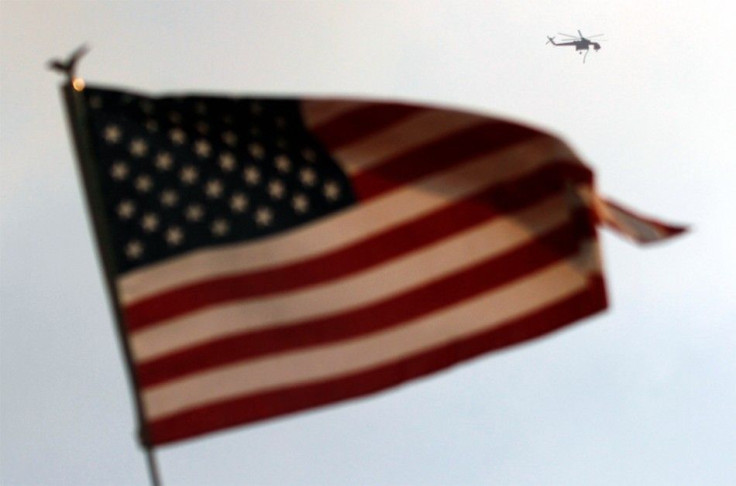America’s 'Swagger' Shrinks, World Suffers
Opinion

Of all the challenges on his plate, U.S. Joint Chiefs Chairman Martin Dempsey worries most about something nebulous -- whether the U.S. can “maintain our swagger” on the world stage.
“Even the Miami Heat,” Dempsey told Washington’s WTOP radio this week, referring to the two-time NBA champs, “if they don’t walk out there with a swagger, they’re going to have less confidence than they need to have.”
Dempsey asks the right question, for the U.S. faces not only the prospect of defense budget cuts this year and beyond that will threaten America’s ability to keep the global peace and protect freedom, but also such challenges as Chinese and Russian cyberespionage, Iran’s nuclear progress, a proxy war by U.S. adversaries in Syria, Afghanistan’s future and al-Qaeda’s resilience.
As Dempsey suggests, though, swagger is as much about attitude as more concrete matters. It’s about the confidence in top policy circles that America has a special role to play on the global stage, that the world suffers when it doesn’t play that role, and that it deserves respect from allies and adversaries alike.
These days, America’s swagger is shrinking and, as long as that continues, both the nation and world will suffer.
On the world stage, the nation seems adrift and unsure, pursuing unrealistic paths to progress on first-tier issues and strangely focused on second-tier ones. Rather than strut like the world’s undisputed leader, America often wobbles like a punch-drunk fighter, one whose glory days have come and gone.
At times, the wounds are self-inflicted. Due to budget cuts, the Army announced this week that it will eliminate at least 12 combat brigades (cutting the number of active duty brigades from 45 to 33) as part of a plan to cut the Army from 570,000 to 490,000 soldiers. It may cut 100,000 more active duty, National Guard and Reserve soldiers if the president and Congress let the “sequester” budget cuts continue into next year, officials said.
Meanwhile, as columnist David Ignatius outlined, the Air Force has “grounded” about one-third of its fighter squadrons, amounting to about 250 planes, and is “cancelling for the rest of the year its ‘Big Flag’ combat training exercises, along with courses at the Air Force Weapons School.”
In addition, he reported, two-thirds of the Navy’s nondeployed ships and aviation squadrons “won’t meet readiness targets” by this fall, and the Navy has delayed planned deployments around the world.
All told, America’s military readiness is “plummeting,” in the words of David Deptula, a retired Air Force three-star general who commanded America’s no-fly zone over northern Iraq in 1998-99.
“The hollow force caused by sequestration,” Deptula wrote in a recent Wall Street Journal op-ed, “means that the U.S. has a growing strategy-resource mismatch: a widening gap between what our leaders say and what the nation can accomplish. Sequestration was designed to be so irresponsible that Congress would prevent its implementation. Now that it has been implemented, the danger is that Washington begins to think the military cuts are tolerable.”
At times, the nation seems out of touch. While the slaughter continues in Syria, with deaths now reportedly topping 100,000, U.S. officials continue to meet with their Russian counterparts in search of a diplomatic solution to the fighting -- even while Russia publicly supports Syria’s Bashar al-Assad and refuses to push for his departure.
Indeed, the two sides can’t even agree on who might attend a U.S.-proposed international conference to find a diplomatic solution, notwithstanding the fact that its odds of success are virtually nonexistent.
While America pursues diplomacy, Russia is teaming with Iran and Hezbollah to strengthen al-Assad’s forces with arms or fighters, confronting the U.S. in what’s become a proxy war. Washington plans only to send “light” weapons to the rebels – which will both leave the rebels still shorthanded in a war that al-Assad now looks increasingly likely to maintain indefinitely if not win, and leave U.S. allies in the region and elsewhere frustrated about our relative inaction.
At times, the nation seems ill-focused. As North Korea continues to threaten the U.S. with missile strikes and Iran ploughs ahead on its nuclear and ballistic weapons programs, Obama went to Berlin’s Brandenburg Gate to promote his vision of a nuclear-free world and propose another round of U.S.-Russian nuclear arms reductions.
Unlike Kennedy’s visit to Berlin in 1963 and Reagan’s in 1987, when the Cold War dominated America’s global posture, Obama’s came at a time when America simply has greater foreign policy challenges than U.S.-Russian arms control and, frankly, fewer realistic prospects of achieving it.
U.S. drift invites global irreverence, which helps explain why Russia reacted coolly to Obama’s latest arms reduction initiative, why it continues to boldly thwart America’s global efforts, and, most recently, why it has refused to extradite national security leaker Edward Snowden to the U.S.
For its own sake and the world’s, America desperately needs to stop crouching, start standing and resume leading.
Lawrence J. Haas, former communications director for Vice President Al Gore, is a senior fellow at the American Foreign Policy Council and author of “Sound the Trumpet: The United States and Human Rights Promotion.” Follow him on Twitter @larryhaasonline.
© Copyright IBTimes 2025. All rights reserved.





















